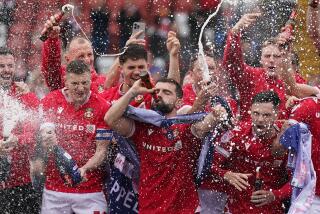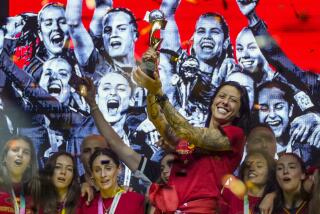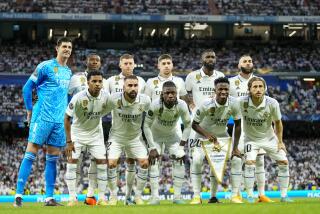It’s Soccer on a Teutonic Scale
The stadiums are ready, the grass is cut and sleek. The giant sculptures of Bayer aspirin tablets and Adidas soccer shoes, proud German inventions, rise over parks and fields. Out walking their dogs or sunning in the Tiergarten, Germans seem happy, almost loose, ready to become unhinged by the madness, euphoria, heartbreak and torment of the World Cup.
The monthlong soccer tournament is a swirl of passions and nationalism, superstitions and prayers, bets and scandals. Old legends are recollected and new ones blossom. It is the alchemy of sporting genius and marketing prowess, echoing with dozens of languages and fans that include Asian Buddhist monks, topless Brazilian women, chattering Italians, drunken Brits, irreverent Czechs and, dare we say, the nearly giddy Germans.
“The image of the German people outside of Germany is not very good. But we’re reunified and we’re in the middle of Europe. We know how to party,” said Markus Kurscheidt, a sports economist at Ruhr University. “No one would believe that Germans know how to celebrate. You tend to think of the Italians. But Germans know how. The World Cup is a chance to show that Germans are nice.”
Germany has been preparing for six years for the tournament that begins Friday. Teams from 32 countries will eliminate one another until the championship match July 9. Play will be scattered among 12 stadiums stretching from Munich to Hamburg to Berlin, where the 1936 Olympic stadium has been renovated with a translucent roof. Three million tickets have been printed, and the overall economic benefit is expected to be $10 billion.
“It’s a fever that grows and grows, and as it comes closer I completely devote myself to soccer,” said Bernhard Dizer, a philosophy student. “There is nothing that touches soccer. There is no higher religion of sport. If you win, you are king of the world.”
Before it has a chance to play king, Germany must be innkeeper for more than 1 million expected visitors. To help the arriving throngs navigate the country’s rigid personality, Der Spiegel magazine’s online version has posted the “Germany Survival Bible.” It is filled with cultural idiosyncrasies on such things as nude coed saunas, leaf sweeping, statistical obsession, bicycle fanaticism and the darker side of the beloved garden gnome.
“The common garden gnome has fallen on hard times,” the survival guide says. “He’s despised as the embodiment of kitsch and petit-bourgeois parochialism. Some outsiders have even sought to savage the image.... There are pornographic gnomes, one-eared Van Gogh gnomes and ‘Scream’ versions a la Edvard Munch.”
Who knew?
Such knowledge could be useful in a beer hall after a soccer match, when, say, a diversion is needed to calm arguments about David Beckham’s power or Thierry Henry’s grace, not to mention the German coach who lives in L.A. and flies in like a prodigal prince.
Gnomes aside, the World Cup lands here as Germany is rising in international stature. The nation was the world’s leading exporter in 2005. Chancellor Angela Merkel is a formidable voice in Europe and has begun repairing relations with the United States that were damaged over Berlin’s opposition to the Iraq war. And many Germans hope, although they consider it unlikely, that their team will repeat 1954, when it won the first of its three World Cup victories and lifted the nation’s image after World War II.
This year’s tournament will conjure past demons and rouse present fears: terrorism, neo-Nazi and right-wing radical marches, hooliganism, racist slurs and, when Iran takes the field, questions about nuclear weapons and Middle East tension. Security concerns have led the German Parliament to consider deploying the army around certain venues, a sensitive prospect.
“We’re used to the green suits of police in the streets, but not soldiers,” said Linus Zahn, a theater sound and lighting technician.
For many fans, sex is more of a concern than battalions. The country’s iconic sex store, Beate Uhse, is selling “sporty vibrators” and a “World Cup Porno” film. Sex for money is legal here, and human rights groups have criticized Germany for allowing prostitution, including a new Berlin spa where customers can sauna, swim, sip champagne and negotiate prices with escorts on staff. An estimated 40,000 prostitutes from Eastern Europe may join the 400,000 women already working in brothels, hotels and homes and on street corners.
Like most sports extravaganzas, the World Cup, run by the Federation International Football Assn., is also about money, marketing and sponsors. This makes for endless advertisements and peculiar ironies. Germany, for example, is renowned for cars and beer, yet South Korean automaker Hyundai, not Mercedes-Benz, is the official car sponsor, and U.S.-based Anheuser-Busch won the beer concession.
“The beer issue was a problem,” said Dizer, the student, reflecting on what once seemed imponderable. “How can it be that we as the beer nation have to drink Budweiser?”
American beer is one thing, but the British press, gleefully mining obscure tidbits of World Cup-related news, can unnerve even the most seemingly impervious of Germans. London tabloids have a penchant for tweaking this nation about the previous century’s wars. This atmosphere was further riled recently when a British paper ran a picture of Chancellor Merkel, her bottom exposed, while she was changing from her bathing suit on a seaside vacation. The Germans were incensed; the Brits chuckled.
German columnist Harald Martenstein has since chided England about its World Cup prospects:
“I think when the German football team is on the pitch it is always reliving in a traumatic way the shaping event of our postwar history, the economic miracle, the surprise rise from the ruins, while the England team is condemned to constantly relive, as if it were in an endless time loop, the collapse of the British Empire.”
But it is only a game, 90 minutes of fluid ecstasy and sorrow, where every goal is cherished, like a bit of magic caught briefly in a net. The bookies are busy, the saints called upon, and the fortunetellers align dates and games with stars and moons. Those waiting for miracles often wait in vain, but sometimes human endeavor and swift feet rise to legend and a country roars with joy until angst begins anew with the next round.
Almost everywhere but the U.S., soccer is wrapped up in national identity and, even in this era of globalization, flags are waved, folklore is sung and borders are drawn inside stadiums. It is war with a ball, and occasionally it is marred by racism and ugly nationalist sentiments that governments and police have attempted to quiet for years.
In March, Adebowale Ogungbure, a Nigerian who plays for a German club, was spat on and called an “ape” and other slurs by hooligans as he walked off the field after a game. Enraged, but accustomed to such insults, he responded by lifting his arm in a Nazi salute.
A few weeks later, a black engineer in Potsdam was beaten into a coma in what police said was a racist attack. A former government spokesman said last week that blacks may not be safe in some east German cities during the World Cup.
“There are small and medium-sized towns in Brandenburg, as well as elsewhere, which I would advise a visitor of another skin color to avoid,” said Uwe-Karsten Heye, who now directs an anti-discrimination network.
German officials said the comments exaggerated the problem, but the government is worried that racist incidents involving neo-Nazis will spoil Germany’s image. Sixteen neo-Nazis were arrested last month in connection with attacks on dark-skinned foreigners in three German cities. A new Interior Ministry report shows that right-wing violence jumped 23% in 2005.
Dizer and Zahn are more concerned about getting tickets. Sitting the other day in a Berlin cafe, the two young soccer fanatics, listing the quirks and foibles of the German team the way a brother assesses his sister’s choice in men, were ticket-less for the biggest show on Earth. Seats to the Cup’s 64 matches were awarded by lottery, except for about 500,000 given to 21 corporate sponsors. That has led to rancor across Germany, and some VIPs, wanting not to appear like Marie Antoinette, have forgone the perk.
“It’s really a shame that people really into soccer can’t get tickets but CEOs who don’t care about soccer at all get them for free,” Dizer said.
But then Dizer mentioned that he’d heard that the German beer Bitburger would be sold along with Budweiser inside stadiums. A tall man with wire-rimmed glasses, Zahn nodded the way a guy nods when he suspects that things may work out after all.







